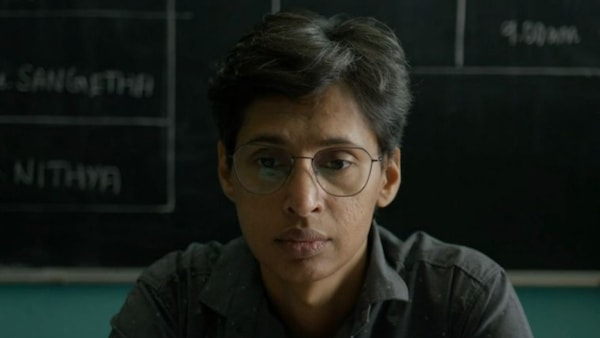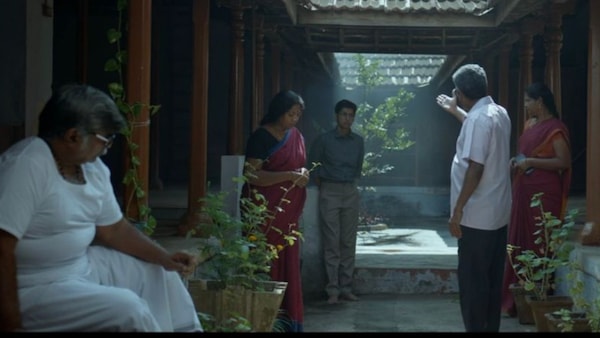Neela Nira Sooriyan at IFFI 2023: Elated I am on the same list as Vetri Maaran and Mani Ratnam, says Samyuktha Vijayan
Neela Nira Sooriyan (Blue Sunshine) is all set to be screened in the Indian Panorama section at the 54th International Film Festival of India, to be held in Goa from November 20 to 28

Last Updated: 06.50 PM, Oct 24, 2023
Entrepreneur, techie and filmmaker Samyuktha Vijayan's career in the industry couldn't have started on a better note. Her maiden venture, Neela Nira Sooriyan (Blue Sunshine) has been selected to be screened in the Indian Panorama section at the 54th International Film Festival of India (IFFI) and Samyuktha is exultant. The indie film is about a school teacher in Coimbatore, who undergoes transition from male to female. In a chat with OTTplay, the Seattle-based filmmaker talks about giving wings to her dreams and what went into her debut project.
What made you take the plunge into films?
I am a trans woman and techie, working in Seattle. I have always been unhappy about the LGBTQI+ representation in Indian films, especially Tamil films. Our filmmakers always miss out on the nuances of being a trans person as the characters are predominantly played by heterosexual male or females.
So I thought why not write something and make a simple movie about a person who undergoes the transition journey. My personal experience in transition from a man to woman has been insane and I did it in Seattle. I went in as my previous self on Friday and got back to work as Samyuktha on Monday. It was as if I was Samyuktha all along. Nobody made a big deal about it. But I was pretty sure this wouldn't have been the case if I were in India, and in my hometown in Pollachi, Coimbatore.
How did Neela Nira Sooriyan happen?
I wrote, directed, produced and played the lead in the film. Though Neela Nira Sooriyan is not my personal story, it has got a lot of elements that I borrowed from certain events from my transition. It took about two years to write the film. I have no experience as a writer or director and I have not even been on a movie set.
When the pandemic struck in 2020, I was in Seoul in South Korea. We were all isolated and that's when I started writing. I watched a lot of YouTube videos, masterclass, screenplay writing etc. I was watching, reading, and getting to know all that I needed to know about writing. It took me two years to finally pen what I thought was good enough to be made into a movie.
On the other hand, I was confident about directing. I had reached out to a bunch of assistant directors and filmmakers in the Tamil industry. Every time I spoke to them, I realised that their frame of reference for making movies was very different from that of mine. They had a very cinematic lens to the whole thing, and a heterosexual male gaze to a transgender person's life. That's not what I wanted.

The transitioning process in a person's life is an extraordinary affair. The way people behave or react to it is different. But the event itself is not extraordinary in any sense. I wanted to bring that sensitivity to the film and I decided to put on the director's hat myself. I gathered a bunch of cinematographers and assistant directors. We were about ten people working on the film last November.
How was the experience facing the arc lights for the first time?
Absolutely uncomfortable! On the first day of the shoot, the fellow artiste, who had some prior experience in theatre, was hitting it out of the park. I was fumbling. I became camera conscious and forgot my lines. I thought the film was going to be a disaster. I was constantly worried as I had never put myself out there. Things were only a tad better on the second day. I was wondering if I needed to postpone the shoot for a week, but I knew time was running out and I had to get back to the US. From the third day onwards, things were on track. We shot the film in Pollachi.
Did you expect that the film would be received so well?
Frankly speaking, I had this massive fear of rejection and hence, I didn't even apply to popular film festivals, like Sundance. The jury said that they had contentions about many selections, but it was a unanimous decision to award my film. I was floored. My film may not be extremely well-crafted, but it was the power of authentic, subtle and personal storytelling that worked for Neela Nira Sooriyan. Many members from the LGBTQI+ community, who attended the screening said that the film struck a chord with them.
We just had our world premiere at the Tasveer South Asian Film Festival in Seattle, where Neela Niram Suriyan won the award for the Best Narrative Feature. I was going through the list of films to be screened at IFFI and I realised that I was the only woman filmmaker. Moreover, I am on the same list as reputed filmmakers Vetri Maaran and Mani Ratnam! The film has also been selected for screening at the Kolkata International Film Festival.
What is the need of the hour when it comes to LGBTQI+ community representation in Indian cinema?
The biggest problem is bringing out the authenticity of the character. It cannot be run of the mill, and we always tend to provide the heterosexual person's gaze of the community. The authenticity factor can be upped by getting a trans person or a gay person to the discussion at the writing stage to understand their perspective.
Secondly, I would like trans characters to be played by trans people. I understand it's not going to be easy all the time and good actors can play any part. But authenticity comes from the fact that this person has experienced it all in real life. So casting folks should take that little effort, reach out to more people and see if they can play the role.
Now that you have a film in your kitty, are you looking at a full-fledged career in cinema?
Why not? I want to play a character with substance, which has some gravitas to it and not just a token role. I would also like people to approach me to play a woman on screen as I identify as one. I am willing to work with anyone. As for my next project as a filmmaker, it's going to take some time as I have a full-time job in the US.

